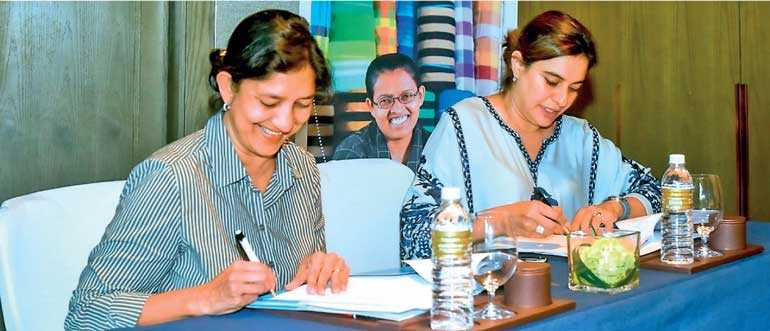Friday Mar 06, 2026
Friday Mar 06, 2026
Wednesday, 18 December 2019 03:21 - - {{hitsCtrl.values.hits}}

IFC, a member of the World Bank Group, has joined hands with the Ceylon Biscuits Ltd. (CBL) Group to provide training and business development opportunities to strengthen and increase female participation in retail supply chains in Sri Lanka.
The project will also focus on promoting digital payment methods among retailers and distributors and on improving the efficiency of the Fast Moving Consumer Goods (FMCG) distribution chain.
CBL, a market leader in biscuits, confectionary and value-added food products in Sri Lanka, and IFC will together train close to 5,000 distributors and retailers across the country. Of them, 30% will be owned or managed by women.
“As Sri Lanka’s largest biscuit manufacturer with a diverse product portfolio catering to local and export markets, innovation-led business strategies have placed the CBL Group at the fore of market leadership,” said CBL Group Managing Director Sheamalee Wickramasingha.
“A key factor in the group’s success has been its longstanding relationships with its distributor network which supports distributors as business partners and fosters sustainable development in the retail sector. We believe that this project will drive inclusive growth and help build a strong future-ready small and medium retail trade sector in the country.”
Sri Lanka’s one million SMEs – 14% of which are owned by women – are an engine for job creation, accounting for 80% of all businesses in the country. The FMCG sector – which accounts for 30% of the country’s gross domestic product and close to 20% of employment – relies significantly on SME multi-brand distributors and retailers to reach consumers. However, a lack of business planning as well as ineffective financial and human capital management curtail the growth of these retailers and distributors, more so for women retailers and distributors.
“Providing women retailers and distributors with a formal skillset to manage and operate businesses will help improve their development, increase their potential to succeed at the next level and recognise their contribution,” said Sri Lanka and Maldives IFC Country Manager Amena Arif.
“This fits well with our country strategy, which seeks to promote financial inclusion and sustainable job creation for women entrepreneurs.”
Traditionally, the retail trade environment is male-dominated in Sri Lanka, making it difficult for more women to own or transform themselves from contributors to decisionmakers or owners.
The project, which is part of the IFC-DFAT Women in Work Program, aims to double the number of women distributors and expects half of the participants to introduce a new business process as a result of the capacity building and training being provided. In addition, 40% of the trained distributers are expected to utilise digital payment mechanisms by the end of the project. IFC, a sister organisation of the World Bank and a member of the World Bank Group, is the largest global development institution focused on the private sector in emerging markets. It works with more than 2,000 businesses worldwide, using its capital, expertise and influence to create markets and opportunities where they are most needed.
In fiscal year 2019, it delivered more than $ 19 billion in long-term financing for developing countries, leveraging the power of the private sector to end extreme poverty and boost shared prosperity. For more information, visit www.ifc.org.